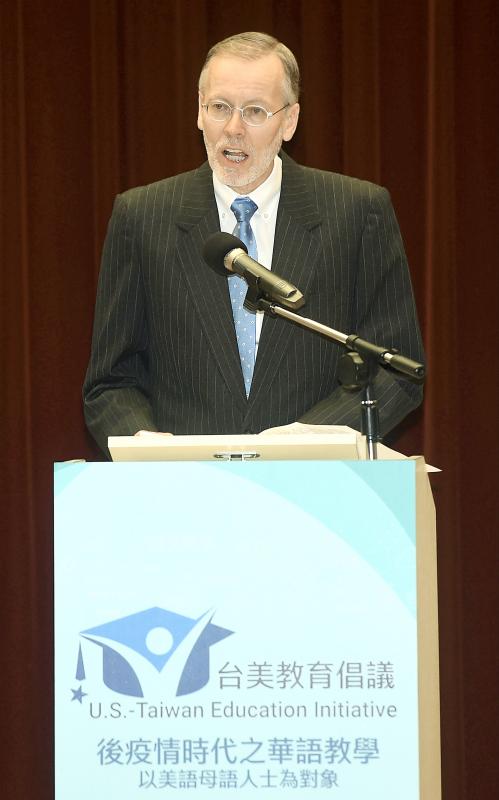With the closure of China’s Confucius Institutes in the US, it is time for Taiwan to fill the Mandarin teaching gap and share “a different version of history” with US students, American Institute in Taiwan (AIT) Director Brent Christensen told the Chinese Language Symposium to Support the US-Taiwan Education Initiative in Taipei yesterday.
“We have all read news stories about the closing of many of the PRC’s [People’s Republic of China] Confucius Institutes in the US. Now is the time for Taiwan to step forward and help fill this gap — not only to teach Mandarin and learn English, but to more fully tell Taiwan’s story to their American students,” Christensen said in Mandarin.
The US Department of State in August last year designated the Confucius Institute US Center as a Chinese “foreign mission” for multifaceted propaganda efforts.

Photo: Chien Jung-fong, Taipei Times
After Taiwan and the US last month signed a memorandum of understanding on international education cooperation, both sides have agreed to expand existing programs, including the Fulbright Foreign Language Teaching Assistant Program, Christensen said.
Wishing good luck to about 60 program participants who are to teach Mandarin in the US, he told them they play a crucial role in teaching young Americans a language spoken by 1.3 billion native speakers around the world and have the opportunity to tell a different version of history than the one taught at Confucius Institutes.
‘CIVIC AMBASSADORS’
Encouraging Taiwanese instructors to serve as “civic ambassadors” and make more friends, National Security Council (NSC) Deputy Secretary-General Hsu Szu-chien (徐斯儉) said the government attaches great importance to the program, and the council since May last year has been coordinating inter-agency efforts to make plans to promote Mandarin teaching in the US and Europe.
Many senior US researchers on Chinese affairs had learned Mandarin in Taiwan during or after China’s Cultural Revolution, Department of North American Affairs Director-General Douglas Hsu (徐佑典) said, but added that when Taipei stopped funding the Stanford Center at National Taiwan University and China opened up to the world late last century, many Americans turned to China to learn the language, which resulted in their alienation from Taiwan’s views when addressing cross-strait issues.
As many prestigious universities in the US, including military academies, are establishing Mandarin-teaching departments, Taiwan should take the opportunity to tout its teaching resources online and offline, he added.
In the US, the number of K-12 students learning Mandarin exceeded 400,000 in 2017, doubling from only two years earlier, AIT Deputy Director Raymond Greene said.
US students traditionally chose Spanish as their second language, but more have been opting for Mandarin, he said.
Over the past few years, students and academics have avoided going to China, first due to environmental and then political concerns, as Beijing imposes more totalitarian restrictions on Internet use and the freedom of speech, he said.
Asked if the trend might shift back to Beijing if US-China relations improve, Greene said it is a natural shift for such people to come to Taiwan, adding that the trend would only continue to grow.

NATIONAL SECURITY THREAT: An official said that Guan Guan’s comments had gone beyond the threshold of free speech, as she advocated for the destruction of the ROC China-born media influencer Guan Guan’s (關關) residency permit has been revoked for repeatedly posting pro-China content that threatens national security, the National Immigration Agency said yesterday. Guan Guan has said many controversial things in her videos posted to Douyin (抖音), including “the red flag will soon be painted all over Taiwan” and “Taiwan is an inseparable part of China,” while expressing hope for expedited “reunification.” The agency received multiple reports alleging that Guan Guan had advocated for armed reunification last year. After investigating, the agency last month issued a notice requiring her to appear and account for her actions. Guan Guan appeared as required,

A strong cold air mass is expected to arrive tonight, bringing a change in weather and a drop in temperature, the Central Weather Administration (CWA) said. The coldest time would be early on Thursday morning, with temperatures in some areas dipping as low as 8°C, it said. Daytime highs yesterday were 22°C to 24°C in northern and eastern Taiwan, and about 25°C to 28°C in the central and southern regions, it said. However, nighttime lows would dip to about 15°C to 16°C in central and northern Taiwan as well as the northeast, and 17°C to 19°C elsewhere, it said. Tropical Storm Nokaen, currently

‘NATO-PLUS’: ‘Our strategic partners in the Indo-Pacific are facing increasing aggression by the Chinese Communist Party,’ US Representative Rob Wittman said The US House of Representatives on Monday released its version of the Consolidated Appropriations Act, which includes US$1.15 billion to support security cooperation with Taiwan. The omnibus act, covering US$1.2 trillion of spending, allocates US$1 billion for the Taiwan Security Cooperation Initiative, as well as US$150 million for the replacement of defense articles and reimbursement of defense services provided to Taiwan. The fund allocations were based on the US National Defense Authorization Act for fiscal 2026 that was passed by the US Congress last month and authorized up to US$1 billion to the US Defense Security Cooperation Agency in support of the

PAPERS, PLEASE: The gang exploited the high value of the passports, selling them at inflated prices to Chinese buyers, who would treat them as ‘invisibility cloaks’ The Yilan District Court has handed four members of a syndicate prison terms ranging from one year and two months to two years and two months for their involvement in a scheme to purchase Taiwanese passports and resell them abroad at a massive markup. A Chinese human smuggling syndicate purchased Taiwanese passports through local criminal networks, exploiting the passports’ visa-free travel privileges to turn a profit of more than 20 times the original price, the court said. Such criminal organizations enable people to impersonate Taiwanese when entering and exiting Taiwan and other countries, undermining social order and the credibility of the nation’s